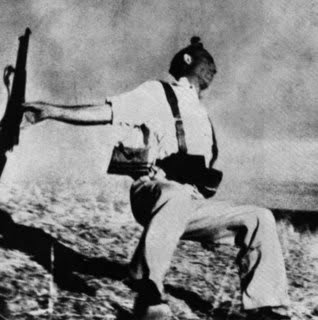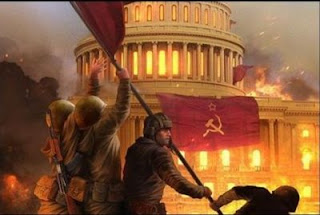Once he has gone will his people forgive him for the corruption and lavish spending and remember him instead as the man who led them to democracy? Maybe. Because whilst the transition from fascist dictatorship to liberal democracy was long and hard for Spain, it was at least comparatively bloodless.
And if the Spaniards want an example of what things could have been like without Juan Carlos, they only have to look to the other end of Southern Europe. There you will find - or rather won't find - a somewhat less happy monarch and a country whose transition from dictatorship to democracy was anything but peaceful.
Death In The Afternoon
 The recent success of Far Right parties in the 2014 European Elections led any to recall the dark days of the Thirties. But you don't have to look back that far to find fascism stalking Europe.
The recent success of Far Right parties in the 2014 European Elections led any to recall the dark days of the Thirties. But you don't have to look back that far to find fascism stalking Europe. There was Franco, of course, who came to power in the Spanish Civil War and was still around when I was born. That war, the crucible in which the ideologies that were to tear the Europe apart in the Second World War tested themselves, was fought on a number of fronts, both geographically and political. As well as the battle between left and right, there was conflict over the role and power of the Church, the monarchy and the regions.
The lead up to the war had seen the inept King Alfonso XIII make such a complete hash of things that everyone except the army ended up hating him. However when he eventually saw the game was up he retired with such good grace that even otherwise sensible people like Winston Churchill believed the right wing propaganda that he'd been ousted by a Communist coup.
The left then won the next election, lost the one after that then won again in 1936 before Franco bought the Army of Africa over in German planes to start the war. The Republican side included, along with the Communists and the Anarchists, very conservative regionalists such as the Basques, whilst the Nationalist side include fascists and two flavours of monarchists; those who wanted Alfonso back and those who wanted the old Bourbon kings instead.
In the end the Communists wiped out the anarchists and then the Nationalists wiped them out. The monarchist and regionalists also lost and so Spain ended up with a short fat General as dictator. On the plus side though they were so worn out by their own little war they wisely decided to sit out the big one that started in 1939.
And Franco was still there, older and fatter, when the Sixties came to an end. The last grotesque spectre from the days of the Nazis.
"A Rape of Democracy"
But Franco wasn't that out of place in the Europe of the early Seventies.
 In Northern Ireland soldiers were on the streets, whilst on the British mainland the National Front was marching and Enoch Powell was talking of Rivers of Blood. In Italy right wing terrorists caused carnage, whilst in Portugal a dictatorship continued to try to hold on to its African Empire in defiance of the world and common sense. However the darkest place in Europe at that time was Greece.
In Northern Ireland soldiers were on the streets, whilst on the British mainland the National Front was marching and Enoch Powell was talking of Rivers of Blood. In Italy right wing terrorists caused carnage, whilst in Portugal a dictatorship continued to try to hold on to its African Empire in defiance of the world and common sense. However the darkest place in Europe at that time was Greece.Greece had flirted with fascism in the Thirties under the brutal regime of Metaxas, whose favoured method of torture was strapping opponents to blocks of ice. However despite his aping of Italian fascism, in one of the numerous ironies of Greek history he found himself under attack by Mussolini.
The Greeks had no problems dealing with the Italians, but the Germans were another matter. Occupation was accompanied by oppression, often as not carried out by locally raised Security Battalions. Winston Churchill - him again - armed the Communists to fight the Nazis, but then when the war was over rearmed the Security Battalions to fight the Communists.
 Greece then limped into the post war world as a bitterly divided nation. A fiercely contested election in 1967 was expected to be won by the centre left. However before the vote could take place power was seized by a group of Army Colonels. This was a big surprise to the King as he had been plotting with a group of Army Generals to seize power after the elections.
Greece then limped into the post war world as a bitterly divided nation. A fiercely contested election in 1967 was expected to be won by the centre left. However before the vote could take place power was seized by a group of Army Colonels. This was a big surprise to the King as he had been plotting with a group of Army Generals to seize power after the elections.The Colonels asked King Constantine to endorse their regime and, after a polite discussion, he agreed. The Colonels then got exactly what they wanted, a picture of themselves with the King bestowing his regal authority on their "military regime of collaborators and Nazi sympathisers."
Constantine then went off and attempted a counter-coup, which was a dismal failure. He was arrested and sent into exile in Rome, but the damage was done.
Tilting at Windmills
However as the Sixties drew to a close both Franco and the Colonels could see that their regimes had no future. Franco killed up to 50,000 people since 1945 whilst the Colonels had tortured more than three and a half thousand, but that was not enough to keep the the spirit of the time away.
In Greece the Colonels relaxed their grip and tried desperately to find someone to hand power over to. Papadopoulos, head of the Junta, approached the old political establishment but only found one man willing to talk to him, a former minister from the 1950s called Spyros Markezinis. In September 1973 he became Prime Minster and the loneliest man in Greece.
Two months later an uprising took place at Athens Polytechnic, with the students demanding peace and love and democracy. Instead they got the army. In the confusion afterwards both Papadopoulos and Markenzinis were deposed and a new hard man took over, the head of the Secret Police Dimitrios Ioannidis. Suddenly the torture chambers were busier than ever.
Watching this from Spain was Franco. Old and ailing, and with his henchmen squabbling, he was planning his own transition from power. Then, in December 1973, his chosen successor, Admiral Blanco was killed by an ETA bomb so powerful that it was joked he became Spain's first man in space. Franco needed a Plan B.
In 1969 he had promised to restore the monarchy. The son of old Alfonso was Juan de Borbon, a well known liberal and opponent of his regime, so Franco decided to skip a generation and promise the throne to his son, Juan Carlos.
It should have been his older brother really, but he'd accidentally shot himself whilst cleaning his revolver, further proof that Royals really shouldn't be allowed near firearms. With Blanco dead Juan Carlos was now in line for power and it was assumed he'd be a convenient sock puppet for Franco's supporters.
But in 1974 everything changed.
On 15 July Ioannidis launched a coup in Cyprus, intending to annex the island to Greece. Four days later Franco fell ill and made Juan Carlos acting head of state. The next day Turkey busted Ionnidis's flush by invading Cyprus. This humiliation was the end of the line for the junta and, with none of his brother officer willing to support his madness any longer, Ioannidis's puppet administration invited former Prime Minister Konstantine Karamanlis back from Paris to form a government.
Franco lingered on for another year, but to all intents and purposes Western Europe's two most brutal regime's had fallen within the space of a few days.
Spain's transition to democracy was not yet complete though and there would be one final test for Juan Carlos. In 1981 a man in a silly hat seized parliament in a coup. Just as in Greece fourteen years earlier, they asked the King to endorse their action. Juan Carlos though was not Constantine. He refused to take their phone call and instead contacted his own Generals one by one to tell them he wanted democracy restored.
Juan Carlos then leaves office tarnished by scandal, but probably ultimately to be well remembered. Former King Constantine of Greece meanwhile remains in exile, unable to return home until he stops calling himself King and gets a normal surname.
Lessons Learnt
Drawing lessons from all this though is very difficult.
In Greece the liberal opposition appeared to play the game by the rules. They refused to compromise with the junta and demanded the restoration of democracy before they would become involved in government. The result though was bloodshed and the tyranny of Ioannidis.
In Spain the liberals and the reactionaries fought it out in secret behind closed doors, and then when Franco was dead they argued in parliament. The ending of the fascist regime was long and drawn out, many people were compromised, but ultimately it was bloodless.
But it was facilitated by a terrorist bomb and the linchpin of it all was Juan Carlos, the democratic monarch, one of the few examples of the blind chance of hereditary accession throwing up the right person at the right time.

.jpg)





















